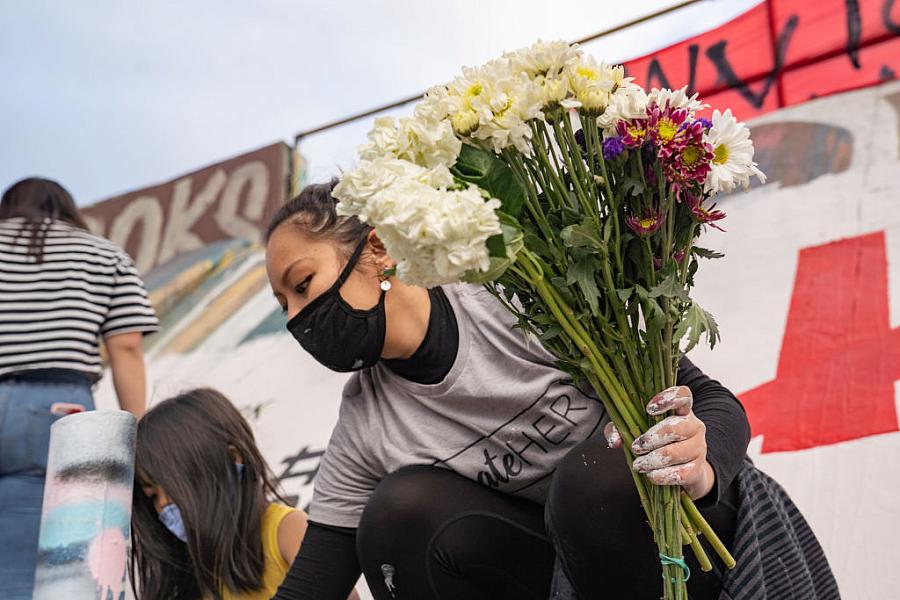Experts shine spotlight on domestic violence in diverse communities

A group paints a mural denouncing anti-Asian hate in Atlanta, Georgia, after a shooting there left eight dead, including six women of Asian descent.
(Photo by Megan Varner/Getty Images)
Experts and advocates working to combat domestic violence say policymakers, law enforcement and members of the media all need to be better at listening to survivors, particularly those from diverse communities and backgrounds.
When Black women or girls — who are disproportionately at risk of being killed by an intimate partner — report domestic violence, law enforcement or service providers often don’t believe them, said Karma Cottman, executive director of Ujima, Inc.: The National Center on Violence Against Women in the Black Community.
“A lot of the times that’s because of the stereotypes people have of Black women,” Cottman said last week during the 2021 Domestic Violence Symposium hosted by the Center for Health Journalism via Zoom. “When officers show up to the scene, they tend to think that Black women are the aggressor or should be much less aggressive.”
These stereotypes can have deadly consequences, Cottman said, pointing to the case of Ma’Khia Bryant, a 16-year-old girl recently shot to death by an officer in Columbus, Ohio, mere moments after police arrived at the scene.
Cottman said that just as young Black men are often racially stereotyped as violent, young Black women are perceived as strong and aggressive, “so we’re not afforded the same protection.”
Programs and services to help domestic violence survivors have been funded and built with a specific type of victim in mind — a middle-class, white woman fleeing her husband, said Michelle Levander, founding director of the Center for Health Journalism, as she introduced the panel featuring Cottman. But that model represents an outdated vision of who domestic violence survivors are and how to best serve them.
Cottman was joined by Grace Huang, director of policy at the Asian Pacific Institute on Gender-Based Violence, and Pablo Espinoza, co-executive director of Community United Against Violence, to talk about their perspectives working with Black, Asian and LGBTQ domestic violence survivors. The panel was moderated by Marketplace reporter Jasmine Garsd.
Most systems, including law enforcement, in the U.S. are racist and biased, Cottman said. As communities begin rethinking how public safety systems should look, those conversations must be led by survivors of violence, she added. Culturally specific organizations can play a critical role in making those voices heard, she added.
“We’re the ones who are going to know what the realities are and what survivors need,” Cottman said.
Huang said the Violence Against Women Reauthorization Act of 2021, currently being considered by Congress, is vital to increasing services for domestic violence survivors, particularly of those from diverse backgrounds. Among many other provisions, the bill passed by the House would expand funding for culturally specific organizations.
Huang pointed to the racial stereotypes surrounding Asian American women that came on display when a gunman targeted massage parlors and spas in the Atlanta area earlier this year, killing eight people, including six Asian women. Some media reports described the Asian victims as “sex workers” without evidence, Huang said, which reinforced racist stereotypes of Asian women as “sex objects” or “exotic.”
“All of those images are ones that we find extremely dehumanizing and really complicate, for those of us in the victim advocacy community, the ability of addressing safety for survivors of domestic and sexual violence,” Huang said.
Perpetrators of domestic violence may take advantage of racism and racial stereotypes to exert control over their victims, she said. Abusers may also manipulate victims through their immigration status and language capacity, Huang said.
Since domestic violence survivors “are the experts in their own experience,” Espinoza said, it’s important for them to determine what services would help or hurt. For example, some of the survivors his San Francisco-based organization serves are sex workers and do not want to be pushed to file police reports. Others, however, might want to interact with law enforcement.
He has seen survivors sharing their experiences at press conferences on what it is like to be a victim of domestic violence and be arrested by immigration authorities for being undocumented. He’s seen them provide testimony at police commissions against giving every officer a Taser.
The COVID-19 pandemic has changed the way Community United Against Violence works with LGBTQ domestic violence victims, Espinoza said.
Survivors have suffered from financial hardship and feelings of loneliness and isolation, as businesses have laid workers off and shut down. For some victims, buying groceries or paying cell phone bills might take priority over dealing with domestic violence, Espinoza said.
“What the pandemic has done… is put a magnifying glass on all of the hardships and social conditions that are really compounding the violence that can happen to folks sometimes on a daily basis,” he said. “We work with folks who are experiencing domestic violence, but within the weaving of their lives (they) are experiencing hate, violence and street harassment on a daily basis.”

